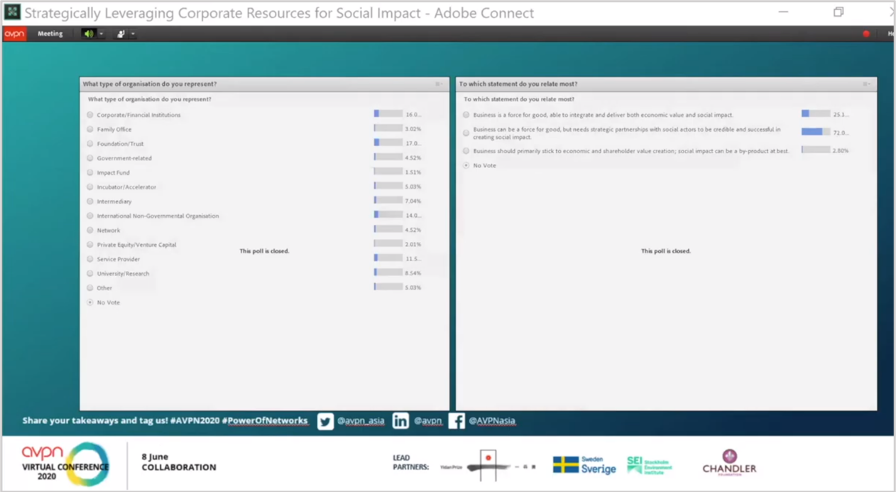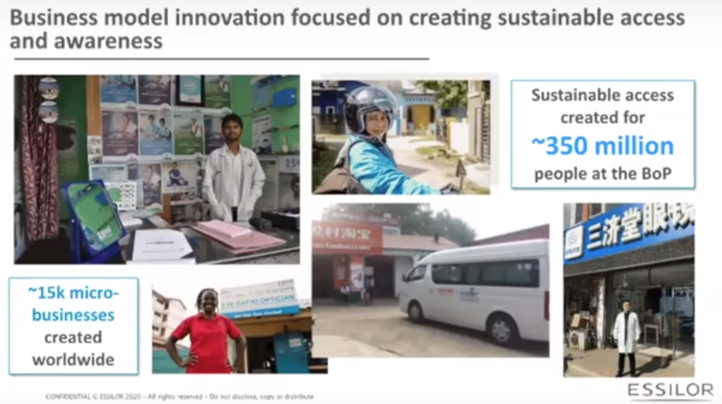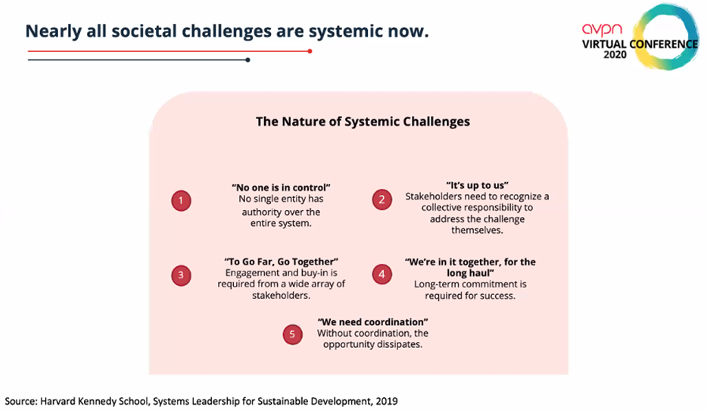6 min read
2020 marks the twenty-fifth anniversary of the Beijing Platform for Action – the UN Women-led blueprint to advance women’s rights, when women empowerment should have achieved significant success. We are far from that, and will actually need another century to reach gender parity. That is certainly not helped by the ongoing pandemic, which threatens to negate even the limited gains made. Across every sphere, from education and health to economy and security, the impacts of COVID-19 have been exacerbated for women and girls.
I was hence delighted to see AVPN dedicate a full day to Gender in the recent Virtual Conference. Of the 7,500 conference attendees, over a quarter of them attended the sessions on Gender, which is a positive sign of interest in gender-related issues. What was interesting was the huge interest from corporates at these sessions. Many indicated their commitment to improving outcomes for women and girls, and engaged with the wider ecosystem on their plans.
Corporates make up 16% of participants in the session on Strategically Leveraging Corporate Resources for Social Impact – the second highest of all categories
In a positive turn, what was previously seen as a ‘problem’ for governments and non-profits has also become the business of corporates. This is not without basis, as corporates that improve outcomes for women and girls will be superior business performers, both financially and socially. In fact, advancing women empowerment in Asia could increase GDP by 12% come 2025, and significantly boost productivity, welfare and growth for corporates.
The question is not whether corporates should care about gender, but how they can do so effectively. In a multifaceted ecosystem of investors, nonprofits and public policy actors, what roles can corporates play to advance the gender agenda? Here are five key takeaways from the AVPN Virtual Conference.
First, understand the gendered effects of happenings around us, and take active steps to support impacted female employees. As schools and care facilities temporarily close due to COVID-19, women have to juggle increased care work alongside their full-time jobs. Dayoung Lee of Dalberg Advisors shared a sobering static: women in India do 10x more unpaid care work than men, and this has become worse during the COVID crisis. With movement restrictions, Julia Newton-Howes of Investing in Women reminded us that women may also be more financially dependent on their partners, putting vulnerable populations at greater risk of poverty and violence. This is playing out in many parts of Asia, with Singapore, Malaysia, Bangladesh and Australia seeing increases in domestic violence.
Corporates big and small employ over 95% of the workforce, and play a huge role in mitigating the gendered impacts of COVID-19. They should keep in mind that unpaid care work falls disproportionately on women, look into extending flexible work arrangements, and support appropriate childcare options. They can also direct employees to needed services, to help address the unintended impacts of stay-home measures. Shanta Vallury Gandhi of RBL Bank encouraged corporates to regard these as opportunities instead of costs, for happy and satisfied employees make productive employees.
Second, make gender-related issues more accessible and relatable. Surfacing topics like feminism and gender equality can push people away, for they are not easily understood. Shutting people out is counterproductive to the very idea of diversity and inclusion in the gender agenda. In this regard, organisations need to make gender-related issues accessible and ‘fun’, to make people more accepting and encourage participation. Pranapda Phornprapha of Dragonfly360 shared her experiences in leveraging popular culture, social media and even fashion to make women empowerment more accepting in the largely conservative Thai society. Priya Paul of Apeejay Surrendra Park Hotels echoed this sentiment; in this age of information overload, organisations need to experiment with non-traditional means to catch people’s imagination. Corporates are well-positioned to do so, given their knowledge of consumers, products, as well as marketing and communications to promote and strengthen their brands.
Pranapda Phornprapha shared a video of Dragonfly360’s Wo = Men Summit 2019, which taps on popular culture, storytelling, art installations and even food to promote female empowerment
Third, move from a purely philanthropic to a more entrepreneurial mindset. In Asia, various corporates are increasingly adopting venture philanthropy practices to improve outcomes for women and girls. These practices include tailored financing (provide grants, debt and/or equity, based on the investee’s needs) and capacity building (eg. provide mentorship and consulting). As these practices are rooted in business logic, they can propel investees to be more business-minded whilst pursing social goals. This in turn creates a win-win-win situation for investees, investors and the communities they serve.
Anurag Hans of Essilor International shared how Essilor has done just that, by supporting over 15,000 microbusinesses worldwide to provide greater access to corrected vision. In helping these businesses become viable, Essilor has created livelihoods for vision care micro-entrepreneurs and their communities, and has also benefitted financially. Corporates can take a leaf from this, and equip women and girls with business skills – which are what corporates are strong at – to better their own livelihoods. This creates stronger socio-economic outcomes than simply adopting a philanthropic approach.
Anurag Hans of Essilor International shared how the company has used business model innovation to scale up Base-of-Pyramid initiatives
Four, use technology discerningly. COVID-19 has accelerated digitalisation and moved many aspects of daily life online. Yet women and girls have benefitted disproportionately from digitalisation, as Virginia Tan of Teja Ventures pointed out. Technology can be a lifesaving line for those with access to it, whether to stay connected, make business shifts or seek help. But for those without phones, these services might as well not exist – and further marginalise the disadvantaged. Veronica Colondam of YCAB Foundation shared a recent realization that several women micro-entrepreneurs do not even have smartphones, and thus could not access online resources that her foundation has created amid movement restrictions.
With generally higher digital adoption rates than the public and non-profit sectors, corporates are well-positioned to leverage technology for social impact. To avoid further marginalizing the marginalized, corporates must ensure that solutions do not only focus on ‘high-end’ technology, but cater to those who are not online too.
Five, go together to go far. Issues affecting women and girls cut across various domains, and require players with different expertise to come together, pool resources and achieve impact that may not be possible singly. Besides optimizing impact, Hari Menon of the Gates Foundation shared how collaborations also ensure multiple perspectives are considered and issues well-understood before actions are taken, thereby reducing risks. With an existing ecosystem of women empowerment, corporates wanting to tackle gender issues do not have to do it alone. They can seek out like-minded players with strong networks and on-the-ground knowledge, to further existing efforts for greater impact. The successful partnership between software company Atlassian and leading non-profit Room To Read to create better futures for girls in Cambodia illustrates this.
Simon McKenzie of the Bridge Institute reinforced the need for collaborations and partnerships to tackle the systematic societal challenges that we face
With gender inequalities costing us some 15% of GDP, women empowerment is no longer ‘good to have’, but urgent and necessary – for both social and business impact. While COVID-19 and its outsized impacts on women and girls may have set us back, it also presents an opportunity for us to do things differently and be more intentional in doubling down on gender issues. Corporates big and small employ over 80% of Asia’s population, and are certainly part of this solution – which not only returns stronger social outcomes, but also makes good business sense. Regardless of the means, improving business outcomes and corporate performance is in everyone’s interest, whether through creating opportunities for half the world’s population, eliminating systematic discrimination or bringing more perspectives to the decision-making table.
To explore how you can connect, learn and lead on gender-related issues, do visit the AVPN Gender Platform.






















